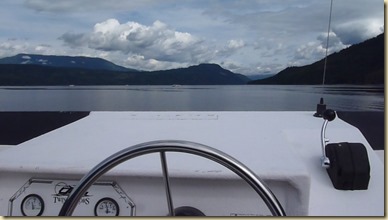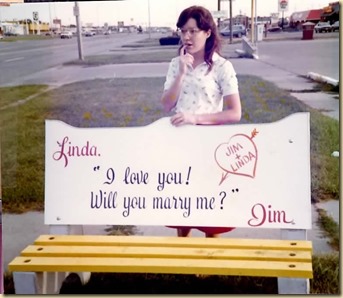Just start moving the fingers over the keyboard… yes, there we go. Sitting here a little tuckered out this a.m. from much cycling yesterday, I’m trying to pull my thoughts together in one place, and get them in print. Always a little daunting despite my love of written words that come out ‘just right’. I finished a good read this summer*, one I’ve been been ‘saving’ to savor ever since encountering its author in his first novel several summers ago.
It was entertaining and thought provoking at the same time–the kind of fiction I love best–and an ideal summer read really, set against a backdrop of fly-fishing. Waiting at the ferry terminal last night for an overdue ferry I got to watch a fellow-waiter wade in and send his line whistling across the water–fly-fishing. I was reading. Peaceful backdrop.
Well, I finally got down to writing a review, really more of a critique, of the book this week which you can see here, if you’re interested, but I haven’t quite finished thinking about it. Something was missing. It wasn’t really a fishing tale, or an environmental plea, though these elements swam along beside the central theme. It was the story of a spiritual journey. Young Gus, the avid fly-fisherman is growing up and coming to terms with the beliefs handed down to him—discarding some, adapting others, and sampling from the spiritual smorgasbord he discovers after leaving home.
The rest of my comments will be ‘spoilers’ I’m afraid. While I loved that the storyline made a case for faith in an unseen God who created this great big beautiful world with all its pristine fishing streams, it also implied that any route to God will do. We each must find our own way, what ‘fits’ for us. Very accepting. Very ‘nice’. Politically correct, I suppose, (otherwise the Sierra Club would likely not have published it!) So I find myself in the afterglow of this brilliantly told tale fishing for words to supply what was missing, to give Gus a sure foundation not deflectable by every current of ‘spirituality’ that crosses his boots.
The missing factors are two: The Son of God and the Word of God. While it’s true that all of creation proclaims there is a God and He is awesome, it does not connect the dots that bring us to know Him personally and live for His glory. Neither the night-sky nor the rippling course of a trout stream can do this. Nor is God found through mystical experiences induced by long walks alone without food or water, any more than in long moments spent soaking in ‘worship’ music till our minds are suspended and our soul’s pores are open wide. Experiences that give a vague but reassuring impression that God is real and present do not equal ‘knowing God’.
The book’s author got this part right:
“I wanted to know my soul. I wanted to befriend Whoever it had been that walked with me on the road, yesterday dawn. But when I stuck my feet in the source-spring I could feel too well the limits of my own unguided yearnings. I would never make it. Not alone. I would never make it to the real source of things unless or until Ol’ Nameless chose to come and find me fishing….
“It’s a damned tough business sitting around trying to force yourself to force God to force feed you a revelation or vision or spiritual assistant or something.” p.246, The River Why, Duncan
True spirituality is not born in mysticism or based on warm feelings or nudges or visions or signs. The knowledge of God is not a mystery hidden for the mystic few. It once was a mystery, but no more. (Rom.16:25,26). The path to God is not a trail we each must blaze on our own hunches and haunches. He is not one thing to me, another to my New Age friend, and something quite other to the fly-fishing, pot-smoking hippie across the street. God Almighty does not come in user-friendly variations to suit the customer in need of love and purpose! He is God and has revealed to us all that we need in order to know Him– in His Son and in His Word. Non-negotiables. Unfortunately, neither of these mediums is politically correct. Handing out Bibles in the town parade is not cool. Using the name of Jesus in any meaningful way is offensive. These are things belonging to those ‘churchy’ types. Sad.
But how much have things changed? In the Garden there was God, walking and talking with His ultimate Creations, Adam and his lovely soul-mate, Eve. One basic instruction: Don’t eat from the tree of the knowledge of good and evil. One basic temptation: You’ll be as gods, knowing good and evil. One hidden flaw: They would indeed know evil, but not as God knows it. He knows it as a cancer surgeon knows cancer. They would know it as a cancer victim knows it. Big difference.** But that was the hidden consequence of taking and eating. They took and ate with misguided self-confidence (‘We can chart our own destiny. Who needs rules?!) and instead of finding a better life, something inside actually died. Relationship with God was severed. Sin does that. Severs relationships. Destroys life. Look around you, in you, beside you. You’ll see its effects. I do.
So we’re descended from this garden pair, wanting to define our gods, to be our own gods, to live how we want to live and still know love and purpose like we had in the Garden. This messy stew is called by the tidy name of ‘moral relativity’. What’s good for you may not be good for me. Let’s each find our own gods. Don’t push your truth on me. So spiritual journeyers surround us on pilgrimage each to his own mecca while the Word of God is relegated to some out of the way shelf or drawer and the Son of God is just too narrow, to controversial, too radical to talk about.
Such behavior is understandable for those who do not have the Word of God and have not been introduced to the Word Incarnate. But strangely it has become common practice among those who would identify themselves as ‘believers’. Strange indeed. Or maybe not. If like Adam and Eve we prefer to live by our own wisdom, not any hard and fast limitations, I suppose it makes sense. How could such an archaic bunch of words as contained in the Bible pertain to me today in my modern lifestyle? Too restrictive. Too ‘old school’. Nevermind, I’ll make my own choices. Somehow it’ll all work out. And we forget the lesson Adam and Eve learned the hard way. There is a way that seems good, but it’s not. Sin, by definition, destroys what it promises to deliver.
And when we neglect to study well the Word of God, we fail to perceive the true character of God. He is love and He is holy. He is grace and He is truth. We may choose to ignore the ‘harshness’ of God toward sin in the Old Testament preferring to focus on the Jesus of the New Testament who went about doing good and healing everybody and loving sinners. We may sidestep the issues of sin and holiness and see in Jesus only a lifestyle to try to emulate. If so, we have missed the Gospel, the message that liberates us from forever trying to find a way back to the garden on our own.
Love and Justice, Grace and Truth are inseparably linked even in Jesus. Sin is forever the impediment to finding God. His love does not negate His Justice. We deserve death, whether He loves us or not. Therefore, He provided Jesus.
Jesus was not tolerant of sin either, though He loved the sinner. He railed against self-made paths to being right with God! Then He suffered the horrors of crucifixion, an undeniable testament to the seriousness of man’s sinful state! He made Himself the way back to the Garden. ‘Take and eat, this my body, given for you.’ (Lk.22:19) Here at last, the solution for the rebellious ‘taking and eating’ of forbidden fruit in Eden. Jesus’ own body,** His blood shed, (Jn.6:53,54) our only chance at finding life, love and purpose that will last an immortal lifetime.
And that’s what I want Gus to know. Now that he has come to believe there is a God who makes all things beautiful and longs to be known, a God who is drawing Him to this knowledge…it’s imperative that he open God’s book, God’s autobiography, and find out who this God truly is and what He most wants Gus to know. Otherwise, he may miss Jesus. He may miss the Gospel. He may spend a lot of years feeling good about being so spiritually attuned to nature only to arrive at this deathbed short of that one-of-a-kind Life that is only found in trading my sin for Jesus’ blood, my impertinent longing for god-ship for the worship of the Only One who is worthy.
Peter’s Spirit-inspired words put it best: “Let it be known to all of you and to all the people of Israel that by the name of Jesus Christ of Nazareth, whom you crucified, whom God raised from the dead–by him this man is standing before you well. This Jesus is the stone that was rejected by you, the builders, which has become the cornerstone. And there is salvation in no one else, for there is no other name under heaven given among men by which we must be saved. Acts 4:10-12
It’s a pretty narrow viewpoint alright, a narrow path. But the destination is Life as it was intended to be! Life beyond our wildest imaginings. And a freedom we had not imagined at the end of such a narrow way. “If the Son shall set you free, you shall be free indeed!” Jn.8:36
There’s an orchard of trees out there– all sorts of alternate roads to ‘spirituality’ and ‘experiencing God’, but only one Tree of Life, one Cross, one Word of God. And that’s I guess what I wanted to say to Gus and affirm to myself here today. Jesus is the Way, the Truth and the Life. Pursuing the knowledge of Him through the revelation given in the Word is the only surefire way to really live!
Indeed, I count everything as loss because of the surpassing worth of knowing Christ Jesus my Lord. For his sake I have suffered the loss of all things and count them as rubbish, in order that I may gain Christ
and be found in him, not having a righteousness of my own that comes from the law, but that which comes through faith in Christ, the righteousness from God that depends on faith… Phil.3:8,9
If you’re looking for some summer reading that will point you to the supremacy of Jesus Christ over all other options, consider Paul’s letter to the Colossians. Dwell long with me on these good words. Here’s the real thing; accept no substitutes. “Therefore…as you received Christ Jesus the Lord, so walk in him, rooted and built up in him and established in the faith, just as you were taught, abounding in thanksgiving. (Col.2:6,7)
‘for in Him the whole fullness of deity dwells bodily, and you have been filled in Him, who it the head of all rule and authority.’ (Col.2:9)
–LS
And this is life eternal, that they might know thee the only true God, and Jesus Christ, whom thou hast sent. Jn.17:3
And this is the record, that God hath given to us eternal life, and this life is in his Son. He that hath the Son hath life; and he that hath not the Son of God hath not life. I Jn.5:11,12
“Enter by the narrow gate. For the gate is wide and the way is easy that leads to destruction, and those who enter by it are many.
For the gate is narrow and the way is hard that leads to life, and those who find it are few.” Mt.7:13,14
*The River Why by James David Duncan, Bantam/Sierra Club, 1983.
**I’m indebted for this idea to James Nicodem, author of a nifty brand-new four-some of books designed to increase “Bible Savvy’ among laypersons. They are an excellent little set. Reviews coming soon to a blog near you! This picture of the consequences of Adam and Eve’s sin was in the first in the series: Epic:The Storyline of the Bible. (I recommend it! See review here.)







